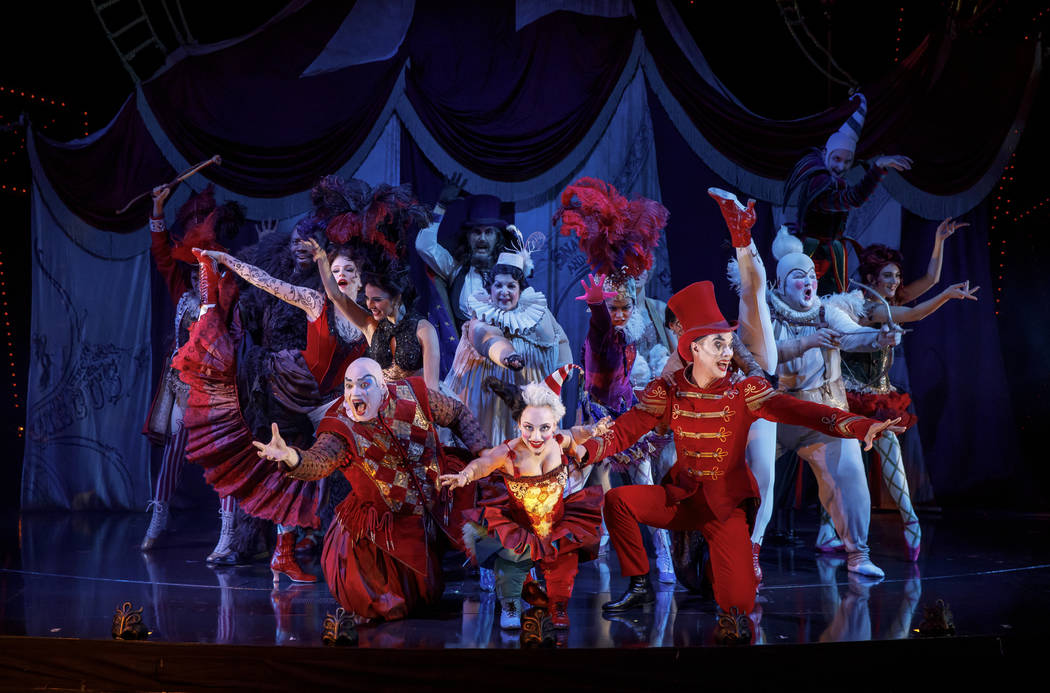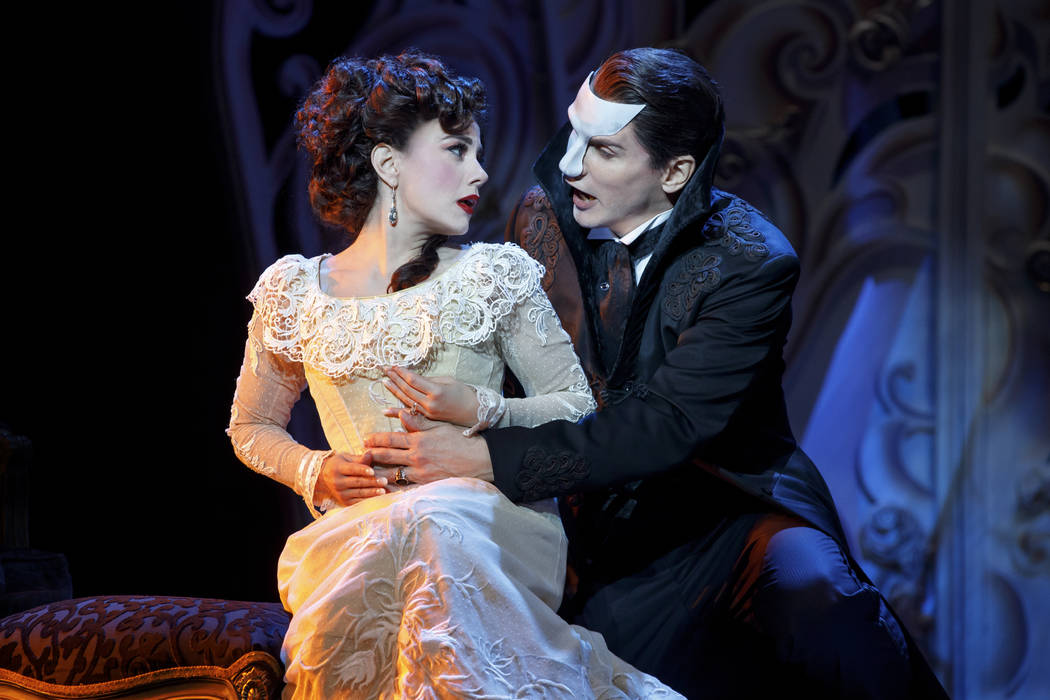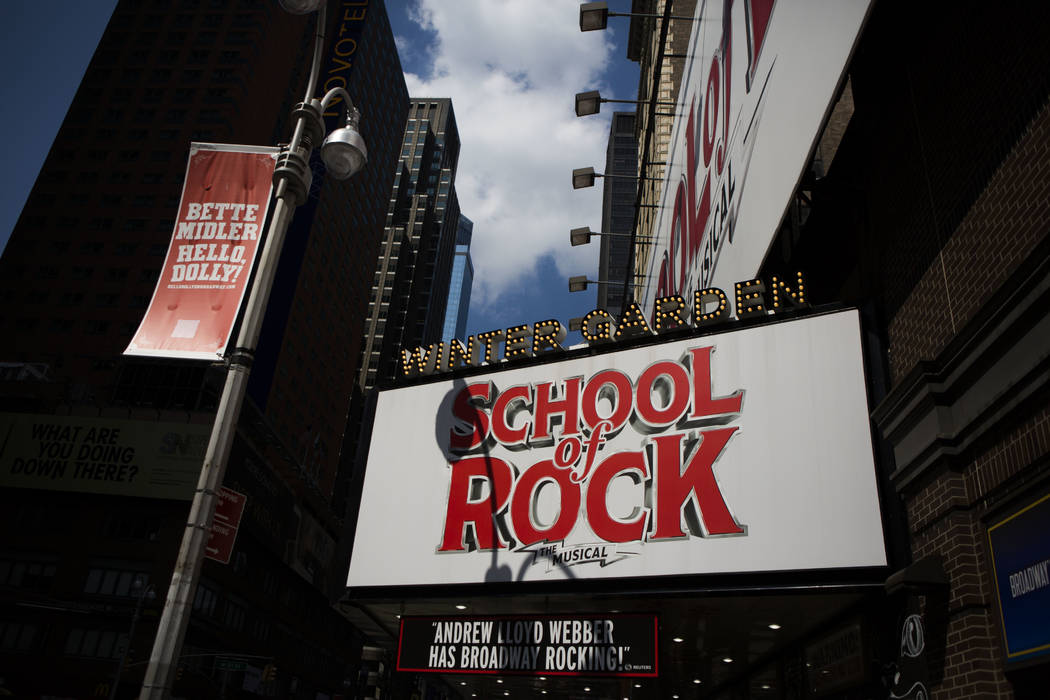‘Phantom’ sequel ‘Love Never Dies’ comes alive at Smith Center





When composer Andrew Lloyd Webber contacted lyricist Glenn Slater’s agent to ask about collaborating on a “Phantom of the Opera” sequel, Slater had an instant response.
“I thought it just sounded like a terrible idea,” Slater says, recalling that he wondered how anyone could create a sequel to the longest-running musical in Broadway history — and reasoning that “anything that comes after it” would be an inevitable letdown.
Still, Webber persisted, asking Slater — a Tony nominee, with composer Alan Menken, for “Sister Act” and Disney’s stage version of “The Little Mermaid” — to peruse a synopsis and “think about the story” before the two met.
“I went in expecting it to be a very nice meeting, but not convincing,” Slater acknowledges. That is, until Webber asked if he could play a demo of the score for Slater.
Most demos capture the composer “noodling at the piano.” Webber, by contrast, went to Abbey Road recording studio in London with “a 90-piece orchestra,” Slater notes. And within 30 seconds of listening, “I said, ‘OK, I am so in.’ ”
Credit “some of the lushest, most gorgeous music I’d ever heard,” which is how Slater describes Webber’s score for “Love Never Dies,” the 10-years-after-“Phantom” musical that opens a virtually sold-out eight-performance run Tuesday at The Smith Center.
Webber specifically wanted an American lyricist for “Love Never Dies” because the musical is set in Coney Island, Slater says, requiring “an American tone and American brashness.”
The composer didn’t view it as a sequel as much as “a second story with these characters,” the lyricist explains.
“These characters” being the mysterious Phantom and his beloved musical muse, Christine Daae, who — in the 10 years following “Phantom of the Opera” has become a celebrated opera diva, the wife of Vicomte Raoul de Vigny (played by Sean Thompson) and the mother of young son Gustave.
“I always wondered what really happened,” says Gardar Thor Cortes, who portrays the Phantom on the current North American tour, reprising the role he previously played in the German production. Audiences also “have been asking for 30 years” what became of Christine and the Phantom, he adds.
Christine is “a working mother — she’s making the money in 1907,” observes Meghan Picerno, who’s making her national tour debut in the role. “Being a working woman comes with its challenges.”
One of them being Christine’s connection to the Phantom, who’s gone to New York — specifically, Coney Island — and found a place where “he fits right in,” Slater notes. “In the original, the Phantom sees himself as ugly. He’s ashamed. He believes the world sees him as a monster.”
At Coney Island, however, “he’s not particularly freakish,” the lyricist adds. “All the values are inverted. Once I figured it out, it was no longer ‘that crazy idea.’ ”
To Cortes, the Phantom “has grown — he is older and, hopefully, wiser,” but “his longing for his love has never diminished.”
Neither has Webber’s desire to bring “Love Never Dies” to the stage.
The initial 2010 London production — with a script by best-selling “Day of the Jackal” author Frederick Forsyth — “wasn’t working the way a musical needs to work,” Slater acknowledges. (That may explain the existence of an active internet campaign, dubbed “Love Should Die,” that characterizes the show as “a non-awaited and ludicrous sequel … that bastardizes the original story.”)
After the musical’s London debut, a revamped 2011 Australian production, headed by director Simon Phillips, “found the key” to making “Love Never Dies” work on stage, Slater says.
Part of the problem with the original: “We had not quite figured out the world the Phantom was in — and who he had become,” Slater says. The Australian version provided “a physical production that captured everything we were trying to do. We said, ‘Yes, you got it right.’ ”
Coming attractions: ‘School of Rock’
The music came first during lyricist Glenn Slater’s collaboration with composer Andrew Lloyd Webber on the “Phantom of the Opera” sequel “Love Never Dies.”
But the songwriting team took the opposite approach for their second collaboration: “School of Rock,” which kicks off The Smith Center’s 2018-19 Broadway Las Vegas season in August.
“Originally, the idea was just to keep the songs” featured in the 2003 big-screen comedy “School of Rock” and “I would change some of the lyrics,” Slater notes.
But, as Slater reminded Webber, “Andrew, you’re the father of the rock opera — this is your wheelhouse,” he recalls in a telephone interview. “The huge power-chord prog-rock thing — that’s what (‘School of Rock’ protagonist) Dewey Finn loves.” And it’s exactly what Webber wrote in such seminal rock operas as “Jesus Christ Superstar.” And when Webber opened a closet at his country home — containing “every rock album from 1962 on” — and started spinning an AC/DC album, he told Slater, “ ‘I can certainly do this.’ ”
So “School of Rock” became a musical with an original score, but Webber had a bit of trouble coming up with melodies in the beginning.
“ ‘I don’t have the American speech cadences,’ ” the composer told Slater. “ ‘Why don’t you get us started?’ ”
Slater initially came up with “some verses and choruses” for the show, about a wannabe rocker turned substitute teacher who transforms his class into a guitar-shredding band. After he did, Webber wrote melodies, “stitching it together” with Slater’s lyrics. “It was a very different experience.”
Yet, in some ways, a more familiar one. Most of the time, Slater writes “more in a contemporary comedic vein,” he says. (The evidence: such “clever, witty, snappy” credits as his Tony-nominated work on “Sister Act” and Disney’s stage version of “The Little Mermaid,” along with the animated features “Tangled” and “Home on the Range.”)
For Slater, writing “Love Never Dies” required him to “stretch outside of my comfort zone.”
Preview
■ What: “Love Never Dies”
■ When: 7:30 p.m. Tuesday-Thursday, with additional performances through March 25
■ Where: Reynolds Hall, The Smith Center, 361 Symphony Park Ave.
■ Tickets: $49-$127 (if available; thesmithcenter.com)
Contact Carol Cling at ccling@reviewjournal.com or 702-383-0272. Follow @CarolSCling on Twitter.
Preview
What: “Love Never Dies”
When: 7:30 p.m. Tuesday-Thursday;, with additional performances through March 25
Where: Reynolds Hall, The Smith Center for the Performing Arts, 361 Symphony Park Ave.
Tickets: $49-$127 (if available; thesmithcenter.com)
Coming attractions: ‘School of Rock’
The music came first during lyricist Glenn Slater’s collaboration with composer Andrew Lloyd Webber on the “Phantom of the Opera” sequel “Love Never Dies.”
But the songwriting team took the opposite approach for their second collaboration: “School of Rock,” which kicks off The Smith Center’s 2018-19 Broadway Las Vegas season in August.
“Originally, the idea was just to keep the songs” featured in the 2003 big-screen comedy “School of Rock” and “I would change some of the lyrics,” Slater notes.
But, as Slater reminded Webber, “Andrew, you’re the father of the rock opera — this is your wheelhouse,” he recalls in a telephone interview. “The huge power-chord prog-rock thing — that’s what (‘School of Rock’ protagonist) Dewey Finn loves.” And it’s exactly what Webber wrote in such seminal rock operas as “Jesus Christ Superstar.” And when Webber opened a closet at his country home — containing “every rock album from 1962 on” — and started spinning an AC/DC album, he told Slater, ” ‘I can certainly do this.’ “
So “School of Rock” became a musical with an original score, but Webber had a bit of trouble coming up with melodies in the beginning.
” ‘I don’t have the American speech cadences,’ ” the composer told Slater. ” ‘Why don’t you get us started?’ “
Slater initially came up with “some verses and choruses” for the show, about a wannabe rocker turned substitute teacher who transforms his class into a guitar-shredding band. After he did, Webber wrote melodies, “stitching it together” with Slater’s lyrics. “It was a very different experience.”
Yet, in some ways, a more familiar one. Most of the time, Slater writes “more in a contemporary comedic vein,” he says. (The evidence: such “clever, witty, snappy” credits as his Tony-nominated work on “Sister Act” and Disney’s stage version of “The Little Mermaid,” along with the animated features “Tangled” and “Home on the Range.”)
For Slater, writing “Love Never Dies” required him to “stretch outside of my comfort zone.”














